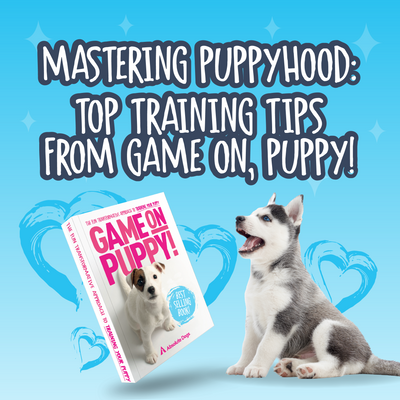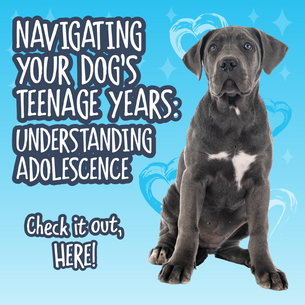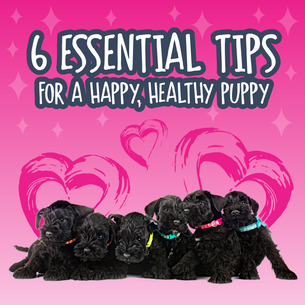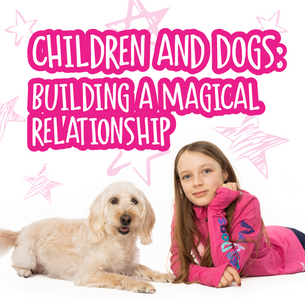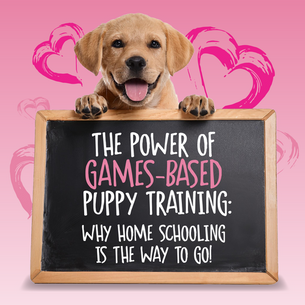Bringing a new puppy into your home is an exhilarating adventure. But as delightful as puppyhood is, it’s also a time of great learning and growth - for both you and your puppy.
That’s why we wrote Game On, Puppy! - a book designed to guide you through the ups and downs of puppy training using fun, engaging games that make learning enjoyable for your puppy and effective for you.
In this blog, we’ll share a sneak peek into some of the transformative training tips you’ll find in the book, sprinkled with practical advice to help you overcome common puppy challenges.
How to Introduce Your Puppy to Other Dogs
Introducing a new puppy to your household can be tricky, especially if you already have other dogs. Here are some strategies to ensure a smooth introduction:
- Separate at First: When you first bring your puppy home, use baby gates or crates to allow them to settle in away from other dogs. This prevents overwhelming interactions and allows both your puppy and your other dogs to adjust.
- Parallel Walks: Once your puppy is comfortable, take your puppy and other dogs on parallel walks. This helps them get used to each other without direct contact, reducing tension and encouraging positive interactions.
- Gradual Introductions: If you have multiple dogs, introduce them one at a time to avoid overwhelming your puppy. This step-by-step approach helps your puppy feel more confident around their new companions.
Training your puppy in a home with other dogs can be challenging, especially if your other dogs want to join in the fun, so we’ve got some tips to make training more effective:
- Train in Separate Spaces: For the best results, train your puppy in a space away from your other dogs. This minimises distractions and helps your puppy focus on learning.
- Boundary Games: By playing Boundary Games, you can train your puppy to wait their turn, while your other dogs learn to remain calm during training sessions.
- Tailored Training: Every dog is an individual, with unique strengths, weaknesses and their own personality. Customise your training sessions to suit each dog’s individual needs, focusing on their specific challenges.
With the right strategies, outlined in Game On, Puppy! training becomes a positive experience for all dogs in the household.
Handling Puppy Biting and Nipping
Ouch! Puppies may be small but those teeth hurt! It can feel really disheartening when your adorable puppy suddenly becomes a wild, crazy, furry beast who nips and bites - and yet it is one of the most common challenges new puppy owners will face.
So first things first. Puppy biting is a completely normal behaviour. That’s good news to get started on, right?! For a puppy, biting serves several purposes during their development and is actually their way of navigating and learning about the world around them.
Puppies familiarise themselves with their environment and explore the world through tasting and mouthing objects, helping them understand what is safe to chew on and the different textures they encounter.
It’s also common for puppies to bite when they are teething, as the discomfort prompts them to seek relief by chewing.
Oh, and just like toddlers, a puppy’s behaviour can seriously deteriorate when they need a nap! And this is a prime time for biting and nipping to escalate.
Here’s how to handle it:
- Redirect the Behaviour: When your puppy starts nipping or biting, redirect their attention to a chew toy or a safe object. This helps them learn what’s appropriate to bite and what’s not.
- Promote Calmness: When your puppy is growling, biting, grabbing at you and things around them, it’s a good sign they are over stimulated, overly tired and they desperately need a nap to reset their tolerance meter. Make sure your puppy has a calm place to relax and get that all-important sleep - and don’t underestimate how much nap time a growing puppy needs.
- Prevent Rehearsal Through Management: Management is all about setting your puppy up for success by making adjustments to the environment which limit their ability to make inappropriate choices. Your puppy will become what they rehearse, especially if they find that choice reinforcing, so limiting opportunities for your puppy to practice biting is really important.
- Consistency is Key: Be consistent with your responses. If your puppy bites during play, they are simply seeking out a social opportunity with you and simply aren't yet aware of the rules of engagement. Calmly remove them to their safe, calm space for some independent self-regulation opportunities. Enrichment activities such as K9-Calm Mats promote calmness through licking - and supporting your puppy’s brain, gut and training with a scoop of Calm-K9 in their daily food will ensure your puppy is at their optimum for processing your training input.
- Use Positive Reinforcement: Reward your puppy with praise and treats when they chew on appropriate items or stop nipping during play. This helps reinforce the behaviours you want to see.
In Game On, Puppy! we explore a variety of games that will help curb biting and encourage your puppy to engage in positive, bite-free play - as well as dedicating a whole chapter to growing and promoting that king of all concepts - calmness! The key is consistency, patience, and a bit of fun!
Handling Visitors and Preventing Jumping on Guests
Whether you live in a very busy household with lots of comings and goings and enjoy having regular visitors to your home, or guests are a less frequent occurrence, your aim for your new puppy should be that visitors are a calm non-event.
Depending on your puppy’s personality, the arrival of new people in your home might be hugely exciting and mean your puppy very quickly gets over-stimulated and starts making poor choices. Equally, it could be that visitors are something your puppy finds worrying. For some puppies, interacting with lots of people they aren’t familiar with can be a very stressful experience.
When you first bring your puppy home you’ll probably find that everyone you know is desperate to meet them, but it’s important to remember your puppy might easily be overwhelmed by all this attention. Regardless of whether your puppy loves visitors or finds them unsettling, being in the centre of the action isn’t always going to be in their best interests. All that extra activity can be truly tiring and can add to your puppy’s stress bucket. The way they learn to feel about visitors and interact with them now is likely to set the course for the way they continue to react to visitors as they grow up.
Remember - rehearsal is powerful!
Check out these top tips for visitor success:
- Reinforce Calmness: Reward your puppy when they have all four paws on the ground. Consistently rewarding calm behaviour helps your puppy understand that jumping isn’t the way to get attention.
- Lead Management: Keep your puppy on a lead or puppy line when guests arrive. This gives you more control and prevents jumping by limiting their options as you guide them to make more appropriate choices, and reinforce their great decisions.
- Educate Visitors: Politely let guests know that your puppy is still in training. Encourage them to ignore the puppy until they settle down, so your puppy doesn’t get rewarded for jumping or other behaviour you would prefer they don’t get opportunities to rehearse.
Incorporating these tips from Game On, Puppy! will set your puppy up for the very best success as they grow and mean visitors become a non-event rather than a source of stress or over-excitement.
Turning Picky Eaters into Food Enthusiasts
Does your puppy turn their nose up at food? Enter Ditch the Bowl, one of the most effective strategies featured in Game On, Puppy!:
- Make Food Fun: Use your puppy’s meals as training rewards. Toss kibble for them to chase or hide it for them to find, turning mealtime into a rewarding game.
- Try Food Toys: Stuff food toys with your puppy’s dinner to encourage problem-solving and calm focus.
- Patience Is Key: It might take a few days for your puppy to embrace this new way of eating, but the benefits of increased engagement and enthusiasm are worth it.
For more top tips on building your puppy’s food motivation, check out our blog: Help! My Dog’s Not Food Motivated.
Build Confidence Through Play
Puppies can be naturally wary of new experiences. Building their confidence through play is a cornerstone of Game On, Puppy!
- Optimism Games: Teach your puppy to associate new experiences with fun and rewards.
- Advocate for Your Puppy: Learn to recognise when your puppy is feeling overwhelmed and give them the space to explore at their own pace.
- Socialisation with Purpose: Introduce your puppy to new sights, sounds, and surfaces gradually, always keeping the experience positive. Socialisation is a vital part of your puppy’s development, but it isn’t just about exposure. In fact, overexposure or poorly planned socialisation can have the opposite effect, creating fear, anxiety, and even unwanted behaviours. Read more in our blog post Puppy Socialisation 101.
With the tools in Game On, Puppy! you’ll not only build your puppy’s confidence but also lay the foundation for a lifetime of trust and resilience.
Ready to Level Up Your Puppy Training?
Game On, Puppy! is more than a book - it’s your go-to resource for navigating the joys and challenges of puppyhood. Packed with actionable tips and engaging games, it’s designed to help you raise a well-rounded, happy dog who loves to learn.
Whether you’re dealing with nipping, jumping, or the chaos of a multi-dog household, Game On, Puppy! has you covered.
Your puppy’s potential is endless. Let’s unlock it together. Game on!
